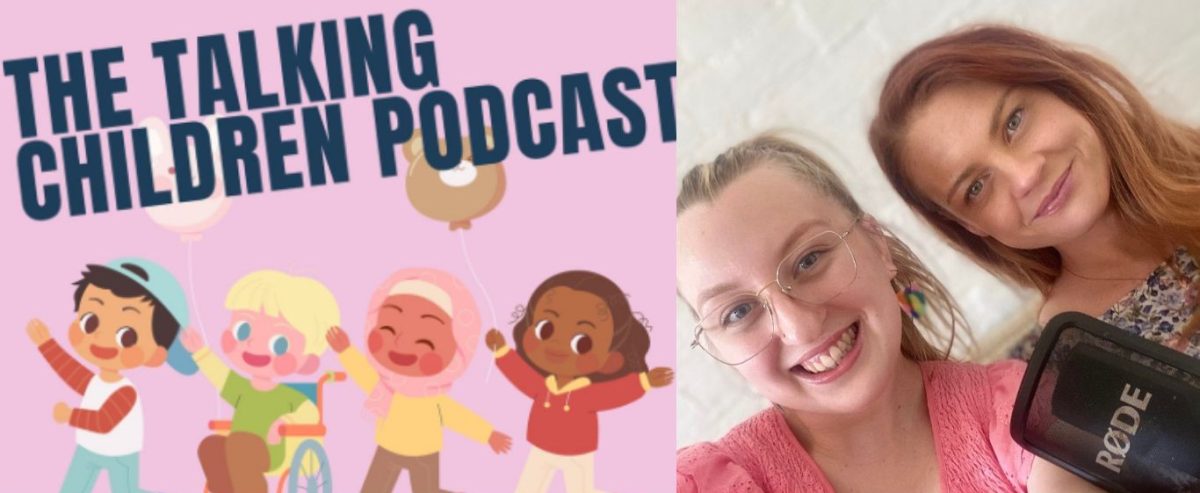
Talking Children Podcast co-hosts speech pathologist Lucia Flint and Associate Professor Sarah Verdon. Photos: Supplied.
Armed with microphones and personal experience, two speech pathologists are on a mission to debunk misconceptions about neurodevelopmental differences in children through a podcast tailored for parents and caregivers.
Early childhood researcher and speech-language pathologist Associate Professor Sarah Verdon and speech-language pathologist Lucia Flint co-host the Talking Children Podcast — a show dedicated to helping listeners apply the latest research in communication development to better support the children in their lives.
Associate Professor Verdon launched the podcast while on maternity leave after realising her family, friends, and clients often didn’t have access to up-to-date information on child development research.
“It would come as a shock. People would say, ‘I’ve never heard that before’. I thought, people need to know this stuff,” Professor Verdon told Region.
“Unfortunately, the way academia works, we publish journal articles behind paywalls. Nobody ever accesses them — only other academics read them.
“I thought, how do we get this information out to the public, and how do we translate it from academic speak into everyday language that’s useful for parents and educators?”
After finding herself having the same conversations with parents repeatedly about topics such as autism and speech development, Professor Verdon considered recording herself.
“People can go away and listen as many times as they like and digest it,” she said.
“Sometimes when you’re in a doctor’s office, you’re getting all this information and it’s like, ‘I wish I wrote that down’, or ‘I wish I could remember what she said about that.’”
Having once been Ms Flint’s university lecturer, honours supervisor, and later her employer, Professor Verdon invited Ms Flint to join the podcast.
“[Professor Verdon] distilled hours of research and journal articles into a digestible podcast I could pop on while doing other things or writing notes,” Ms Flint said.
“It became an easy way to consolidate my learning as a student.
“I got to ask Sarah the kinds of questions parents or community members often have — the ones you’ve always thought about but didn’t know where to get the answer. There’s so much stuff on Google and it’s not always accurate.
“People want something digestible, but they also want it to be evidence-based and factual. We’re trying to be the intersection of easy listening and completely evidence-based.”
Professor Verdon said that when Ms Flint joined her practice the two quickly “hit it off”.
“There was just something about our dynamic — we worked well together,” she said.
“Then we said, ‘Why don’t we just do the podcast together?’ I have ADHD (attention-deficit/hyperactivity disorder), and I find it hard to be on time, organise things, and stick to a schedule. Whereas Lucia is very organised — she’s the yin to my yang.
“We make an excellent pair on the podcast. If she’s not prepared, I am. If I’m not, she is. It always gels together and I think it’s made the podcast so much stronger.”
Some of the conversations the duo have had include why more people are being diagnosed with autism, what Asperger’s syndrome is, and whether it’s different to autism. They also discuss topics such as stimming, a common trait among neurodivergent individuals.
“Stimming is a self-stimulatory behaviour common in autistic people or anyone who’s neurodiverse, like those with ADHD. It’s a way we regulate our bodies through physical movement. I crack my knuckles all the time, and Lucy sometimes repeats words. The stereotype is rocking back and forth, but it’s more than that,” Professor Verdon said.
She added that when a child was diagnosed with autism, many parents felt like it was a death sentence.
“We want to throw that out. Your child’s autism is a beautiful thing. Once you figure out how their brain works — how to support their hyper focus and interests — they can thrive.
“We’re trying to flip the narrative of autism as only a disability. It certainly comes with challenges, because the world isn’t designed for autistic people.”
Professor Verdon said there was often pushback when diagnosing children, as some parents were in denial. However, early intervention around the age of three could make a profound difference, rather than waiting until the child was 10, when challenges might have worsened.
“We’re hoping people listen to us and think, ‘Oh, Sarah and Lou have autism — it’s not a big deal’. Rather than, ‘Don’t say the A-word.’”
“The biggest misconception is that kids will ‘grow out of it’. People say, ‘Let’s wait and see’. But that’s the worst thing to do.
“There is a window of a few years to get them on track before school starts. It gives them the best start to life.”
She also believes ADHD should be seen as a difference, not a deficit.
“We’re better at pattern recognition, attention to detail, and learning everything about a topic. We find it hard to regulate our attention … it’s dopamine-based — if something’s interesting, we’re 100 per cent there. If it’s boring, we zone out.”
Professor Verdon said her approach to practice had changed dramatically over the past 15 years — from suppressing autistic traits to embracing neurodiversity-affirming practices.
“I would never do what I was trained to do back then. I tell parents and teachers, when you know better, you do better. It’s not about blaming yourself for the past — it’s about being open to learning and changing.”
To find out more or listen to the Talking Children Podcast, click here.







